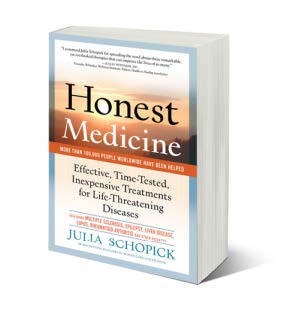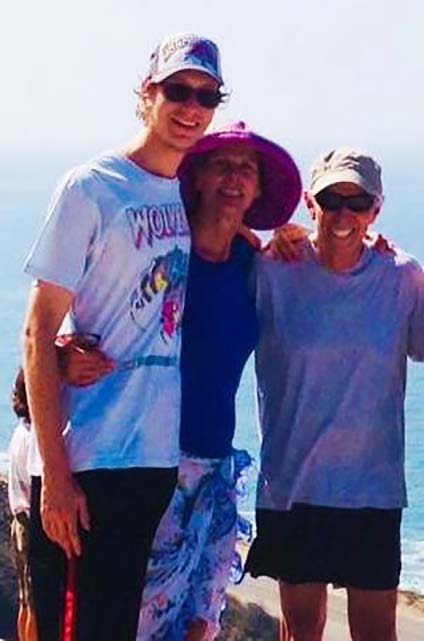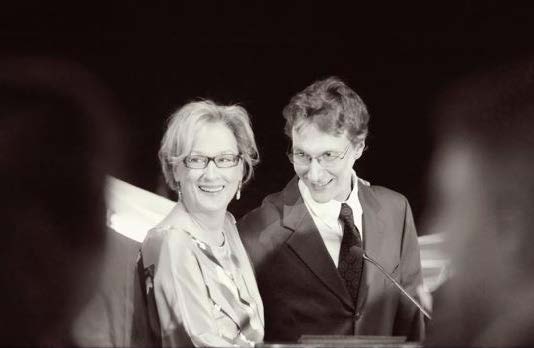BOOK EXCERPT: PART II OF II
HONEST MEDICINE: The Ketogenic Diet for Epilepsy
Author's Note: In Part 1, November, 2020 EP Magazine, you learned how Hollywood writer/director Jim Abrahams' son Charlie was saved from suffering with almost constant seizures — as well as from a cocktail of mind- and body-altering anticonvulsant medications — by the Ketogenic Diet. This life-changing experience led Jim and his wife Nancy to found the Charlie Foundation, through which they educate medical professionals, parents, and patients throughout the world about the diet. In Part 2, you will learn the "rest of the story." Jim's chapter was taken from Julia Schopick's book, HONEST MEDICINE: Effective, Time-Tested, Inexpensive Treatments for Life-Threatening Diseases. It has been updated for EP Magazine by Jim and Julia.
CHAPTER 7
JIM ABRAHAMS: CHARLIE'S DAD, DIRECTOR OF THE CHARLIE FOUNDATION
Because the diet had been in existence for so many years, we began to hear from other families who had had success with the Ketogenic Diet. One of the stories that was particularly dramatic occurred in 1975. Connie Intermitte wrote us about how her then four-year-old son Tim had gained seizure- and drug-freedom with the diet – but not until her family was forced to go through incredible measures. With her permission and input, in 1997, we made an ABC television movie, "First Do No Harm," starring Meryl Streep. Millions watched ( youtu.be/HyeC9IiFKpw) Our goal was to spread the word about the Ketogenic Diet. An unintended consequence was that Connie's story and Meryl's incredible performance empowered so many to take control of their own children's medical destiny. At the same time, we worked through the scientific and medical communities in an effort to facilitate research into the diet's mechanisms and knowledge of its application. To that end, we sponsored meetings among physicians and dietitians and helped support research.
We have held, and continue to hold, educational events for professionals, from our first seminar in September 1995, which was attended by over 100 neurologists, dietitians and nurses, to the first, third, and fifth Global Symposia on Dietary Therapies for Epilepsy and Other Neurological Disorders in 2008, 2012, and 2016.
Awareness ticked dramatically upward. Other parents and parent groups began to spring up around the world. Other families came forth with their success stories.
In 2006, Beth Zupec-Kania, RD, CD, who had been working with the Ketogenic Diet since 1993, joined the Charlie Foundation. Thus far she has trained over 300 hospital personnel and 40,000 professionals globally in this therapy. She has also developed ketodietcalculator, a professional app for computing meal plans, which has over 50,000 subscribers worldwide. Matthew's Friends, a sister organization in England, began in 2004 when Emma Williams' son Matthew was finally offered the diet, six years after she saw "First Do No Harm," and began asking for it. He attained over 90 percent seizure reduction. But by then Matthew had experienced substantial, irreversible brain damage from the years of pummeling by seizures and drugs.
Blogs, chat rooms, and other support groups have sprung up worldwide.

Title: Honest Medicine: Effective, Time-Tested, Inexpensive Treatments for Life-Threatening Diseases
Author: Julia E. Schopick
Publisher: Innovative Health Publishing
Publication Date: January 2011
Paperback: 310 pages
ISBN-13: 978-0982969007
Available at: amazon.com and barnesandnoble.com
The diet itself has been refined in terms of initiation, reduced adverse effects, and palatability. As doctors and dietitians implemented the diet over the years, they developed pre-diet screening procedures to ensure safety and rule out metabolic contraindications, as well as side effects that would interfere with efficacy. Hospitals have developed a team approach in which neurologists, dietitians, nurses, and pharmacologists collaborate on the diet as it is applied to each new patient. Dietary supplements have been added prophylactically to ensure nutritional adequacy and to prevent constipation, the most common adverse effect of the diet. Two new versions of the diet were developed – the Low Glycemic Index Treatment and the Modified Atkins Diet – less restrictive diets for older children and adults. New infant formulas have made the diet accessible to infants and tube-fed children.
And, as the diet has grown in awareness, popularity and understanding, it is beginning to be used with other neurological disorders. Some patients with ALS, early onset Alzheimer's disease, Parkinson's disease, and certain cancers including malignant brain tumors have improved dramatically with the Ketogenic Diet. Our progress was summarized in a June 17, 2009 article published in The Journal of Child Neurology:
"The past 15 years have witnessed an enormous growth of interest in the ketogenic diet. At this writing, a PubMed search indicates that nearly 750 peer-reviewed articles on the ketogenic diet have been published since 1994. In 2006, symposia at both the International Child Neurology Association and Child Neurology Society annual meetings were the first sessions ever held devoted solely to the ketogenic diet. In April 2008, a 4-day international conference devoted to the use of dietary treatments brought 270 attendees to Phoenix, Arizona. The ketogenic diet is now available in over 50 countries, in all continents except Antarctica. As a direct result of this growing interest, an expert consensus guideline was commissioned by The Charlie Foundation, written by 26 neurologists and dietitians from 9 countries, endorsed by the Child Neurology Society, and published in Epilepsia in November, 2008. This consensus guideline was designed not only to suggest the optimal management of children receiving the ketogenic diet but also to highlight aspects of dietary treatments that were unclear and potentially areas of future research." – Dr. Eric Kossoff, Beth Zupec-Kania, RD, Dr. Jong Rho


STAYING POWER: Charlie (left) with parents Nancy and Jim Abraham; and with Meryl Streep (above) at the 2012 Global Symposium on Dietary Therapies for Epilepsy and Other Neurological Disorders. "Beyond promoting public and medical awareness of a therapy that fits like a square peg in the round hole of Western medicine, The Charlie Foundation has an added message. Today, among our top priorities, is empowering parents with the information they need to trust their instincts and battle for their children."
One year earlier, in 2008, Dr. Helen Cross from Great Ormond Hospital in London published a Class 1 randomized double-blind study concluding: "42 percent of children with epilepsy who were following a Ketogenic Diet for three months had a greater than 50 percent reduction in seizure frequency with 19 percent reporting a reduction in seizures of 75 percent or more."
The science has continued to document the reality. According to a 2016 Cochrane Review of Ketogenic Diets' Efficacy, "We identified 11 randomized controlled trials (RCTs) that generated 15 publications. The 11 studies recruited 778 patients; 712 chil
dren and adolescents and 66 adults. Reported rates of seizure freedom reached as high as 55% in a classical 4:1 KD group after three months and reported rates of seizure reduction reached as high as 85% in a classical 4:1 KD group after three months."
Today, there are over 275 hospitals worldwide with Ketogenic Diet programs. The Charlie Foundation has sponsored and run numerous Ketogenic Diet seminars and training programs, and has contributed to many books about the Ketogenic Diet for epilepsy, as well as for other conditions. Our website, char- liefoundation.org is a comprehensive source of Ketogenic Diet resources, including medical opinions, a list of Ketogenic Diet FAQs, keto centers, diet implementation, recipes, other families' stories, and chat rooms.
Most importantly, thousands of children have gotten better. So, I don't want this chapter to read like I'm some angry parent who's still grinding his axe 27 years later. Every day we are overwhelmingly grateful for getting Charlie back, and every day we are overjoyed to hear from other parents who have now had the same experience, in part because of Charlie.
But sadly, as I write this chapter, the Ketogenic Diet for epilepsy remains woefully underutilized. The disconnect between good health and other powerful influences in Western medicine is blatant. The billions being made annually by pharmaceutical and medical device companies; the additional billions being pocketed by the sugar and processed foods industries; the reluctance of insurance companies to reimburse hospitals for Ketogenic Diet trained nutritionists; hospital systems that profit handsomely from surgeries, tests, devices and medications but make no money from Ketogenic Diet therapies; as well as physicians who are not taught about diet therapies all work in concert to obscure this information.
In 2008, medical guidelines were published advocating that the "Ketogenic Diet should be strongly considered after the failure of two or three medications regardless of age or gender." This was considered a giant step forward for a therapy that had been largely considered a "last resort." In a second version, published in 2018, they changed the wording to "after the failure of two medications regardless of age or gender."
But it's not enough. Just imagine how many millions of lives would have been improved, even saved, if physicians were willing to share two uncontested facts:
Fact 1: After the failure of a first antiepileptic medicine there is a 13% chance a second will stop a person's seizures and a 1% chance a third will have this effect.
Fact 2: The Ketogenic Diet reduces seizures by at least 50% in over half the people who try it and eliminates seizures completely in 20%. Both facts are as true in 2020 as they were in 1993 when Charlie first got sick.
What is the point of real evidence-based medicine when the evidence is ignored? What happened to "...first do no harm?" I have great admiration for anyone who would choose to spend his or her life helping children with neurological disorders. Pediatric neurology is very low on the "glitz scale"; it's toward the bottom of the medical specialties list in terms of financial rewards; the responsibility and dedication must feel overwhelming. The neurologists and epileptologists on the Charlie Foundation's scientific advisory board, as well as so many others I've met over the years, are among the most dedicated people I know.
So I do not feel that what happened to Charlie and countless other children like him is due to any one, or a handful, of practitioners. As I mentioned earlier, our health care system frequently rewards tests, procedures, and medications rather than patient outcomes. Dietary therapy, though successful, is time intensive and does not generate revenue. What may be news to many is that physicians are not taught about nutrition, or dietary therapies during their formal training.
Charlie's primary neurologist, Dr. Donald Shields, was incredibly candid when he was asked on "Dateline NBC" about Charlie and the Ketogenic Diet:
Dateline NBC: "Why are modern doctors ignoring this diet? Charlie's own doctor has a surprising answer." Dr Shields: "There's no big drug company behind the Ketogenic Diet and there probably never can be unless somebody starts marketing sausage and eggs with cream sauce on it as a drug." Dateline NBC: "You're saying that, in a sense, one of the reasons that the Ketogenic Diet is not popular at this point is that there's not a big drug company behind it selling it to the doctors?" Dr. Shields: "I think that's probably true. I hate to say that. But I think that's probably true." (The entire interview can be seen on our website at charliefoundation.org)
So, beyond promoting public and medical awareness of a therapy that fits like a square peg in the round hole of Western medicine, The Charlie Foundation has an added message. Today, among our top priorities, is empowering parents with the information they need to trust their instincts and battle for their children. There is a tendency when we walk into a doctor's office to want to hand over our problem and say, "Here it is; please fix it." It's comfortable, it's easy, and more often than not, it works. Just as we take comfort in deferring to them, many doctors are unwilling to confide in us that we may have stepped into one of Western medicine's black holes. Clearly, most children with difficult-to-control seizures have stepped into one of them.
What does this mean? It means that our medical problems and our children's medical problems are precisely that – ours. At first, that's a pretty intimidating and perhaps a seemingly foolish concept, both to us and to some physicians. After all, they went through years of education. They've seen countless patients in their practices. And then we walk into their offices with a disease we probably don't even know how to spell. How presumptuous and perhaps foolish of us, the parents, to ask and then pursue the hard questions, learn the side effects, get the second opinions, do the research, and participate in an informed joint decision with our doctors – in short, to become proactive. Ironically, the "side effect" of participating in our own medical destinies and those of our children may not only lead to getting better sooner. It is also empowering. Though I would do almost anything to go back and have Charlie not suffer epilepsy, the experience has been empowering. Regardless of whether responsibility for informing ourselves confirms what we learn from our physicians, it's nevertheless empowering to become informed.
We take control of so many lesser issues in our families' lives – meals, bedtimes, TV hours – why not have that same attitude with the most important issue, our families' health? In the worst case, we have learned something new; in the best case, we have improved both our lives and the lives of our children. Isn't that each of our ultimate missions?•
[The following comment is by Julia Schopick, in whose book Jim's story appears: "I am frankly in awe of Jim for his yearslong, day-in-and-day-out dedication to helping parents who want the diet for their children to get it. Jim has read letters to me from parents who were told – wrongly – by their doctors that the diet would not work for their children, and that even if it might work, it would be just too difficult to administer. Jim helps each and every parent he can help – even though it brings back such painful memories for him – and even visits many of these children. And in several instances, especially in cases where the diet is being administered incorrectly, he calls hospital personnel to help them get on the right track. Without Jim, I am positive the diet would have died. Without Jim, millions of people with conditions ranging from cancer and many neurological conditions would never have heard about the Ketogenic Diet – not to mention the millions of weight-conscious people who are on the diet today."]
ABOUT THE AUTHOR:
Julia Schopick is the creator of the award-winning blog, HonestMedicine.com, and has been a published writer and a public relations consultant for more than thirty years. When her husband Tim Fisher became ill in 1990 with a cancerous brain tumor, Julia became his medical advocate and began writing on topics relating to health and medicine. Her articles and columns were published in American Medical News (the AMA publication), SEARCH (the newsletter of the National Brain Tumor Foundation) and Alternative and Complementary Therapies. Her work and essays have been featured in the British Medical Journal, Modern Maturity and the Chicago Sun-Times.